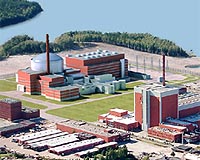 |
Beijing (AFP) March 16, 2011 China on Wednesday ordered safety inspections of the country's nuclear plants and suspended approval of new projects after quake and tsunami disasters in Japan led to an atomic crisis. The State Council, or cabinet, issued the order as Chinese authorities stepped up radiation monitoring of passengers and goods from neighbouring Japan as fears mounted about harmful nuclear contamination from the stricken country. Beijing has begun helping its nationals leave areas in Japan devastated by Friday's 9.0-magnitude quake and ensuing tsunami that have left more than 11,000 dead or missing and triggered great concern about the Fukushima plant. The State Council said government experts believe radioactive material from the damaged plant on Japan's east coast "will not impact public health in China" and stressed "safety is the number-one priority in developing nuclear power". "The meeting decided to immediately organise a comprehensive safety inspection of nuclear facilities in China," the Council said in a statement issued after a meeting chaired by Premier Wen Jiabao. It also suspended approval for new nuclear projects pending the release of new safety rules, as Internet users expressed deep concern about contamination from Japan. China currently operates 13 nuclear plants and is building more than two dozen others -- estimated at 40 percent of all plants being built worldwide. Another 50 more are on the drawing board as China struggles to meet soaring energy demand to feed its booming economy. Despite the Japan calamity, Beijing has insisted that atomic energy will remain a key part of its energy mix. The Fukushima nuclear facility has been rocked by a series of explosions, fires and radiation leaks since the massive earthquake and monster waves cut power to the plant and caused reactor fuel rods to heat up dangerously. China's ministry of environmental protection has said so far no abnormal radiation levels had been detected from Fukushima, which is 1,000 kilometres (621 miles) from the nearest part of northeastern China. But border inspection authorities in Shanghai released a statement Wednesday saying they were checking all incoming travellers, luggage and imports of food and other goods from Japan that enter the city's airport or port. Air passengers arriving in Beijing were being monitored for radiation but officials said this was routine for all passengers even before Japan's disasters and they had not stepped up vigilance. Internet users expressed worries over the safety of food imported from Japan, prompting Japanese restaurants to issue online reassurances that their ingredients had been imported from Australia and Europe. Postings on Twitter-like microblogging sites advised mothers to "be careful" if buying baby formula from Japan while others suggested many people would "give up eating Japanese food" for fear it was contaminated by radiation. The radiation anxiety was by far the most popular topic on the microblog service of leading portal Sina.com, according to its ranking system. Meteorological authorities say any radioactive particles released by the Japanese plant should have no impact on China for at least the next two days, citing current weather patterns. Chinese authorities in Japan have mounted an operation to help evacuate its citizens from disaster-hit areas. State media said so far more than 3,000 Chinese nationals have been evacuated to Niigata on the west coast and about 600 have returned home. There are an estimated 33,000 Chinese expatriates in five disaster-hit Japanese prefectures. China Southern and China Eastern airlines said they have increased flights to Japan while state flag carrier Air China said it would deploy larger jets on Japanese routes to accommodate demand. The state-run China National Radio also reported that two ships able to transport a total of 4,000 people planned to sail Wednesday from the eastern city of Yantai to Japan to bring back Chinese citizens.
Share This Article With Planet Earth
Related Links Nuclear Power News - Nuclear Science, Nuclear Technology Powering The World in the 21st Century at Energy-Daily.com
 Indonesia's nuclear plans intact amid Japan crisis
Indonesia's nuclear plans intact amid Japan crisisJakarta (AFP) March 16, 2011 Indonesia said Wednesday that it will press on with plans to build a nuclear plant close to a volcanic fault line, despite the nuclear emergency in earthquake and tsunami-ravaged Japan. "If we pick to build it on Bangka island, surely it will be based on several considerations which are in line with international safety criteria," the National Atomic Energy Agency (BATAN) chief Hudi Hastowo ... read more |
|
| The content herein, unless otherwise known to be public domain, are Copyright 1995-2010 - SpaceDaily. AFP and UPI Wire Stories are copyright Agence France-Presse and United Press International. ESA Portal Reports are copyright European Space Agency. All NASA sourced material is public domain. Additional copyrights may apply in whole or part to other bona fide parties. Advertising does not imply endorsement,agreement or approval of any opinions, statements or information provided by SpaceDaily on any Web page published or hosted by SpaceDaily. Privacy Statement |